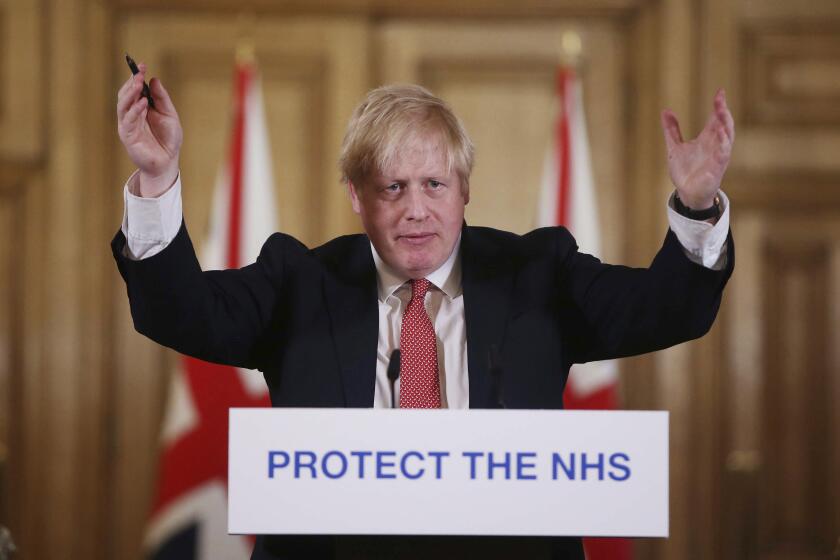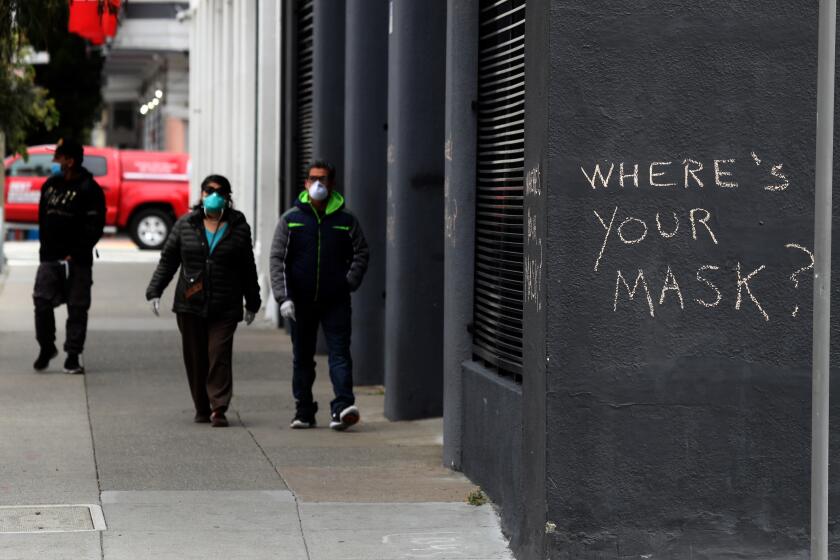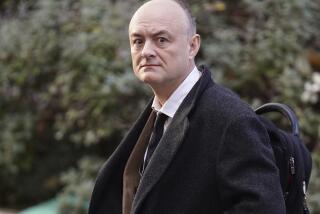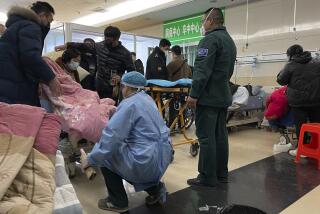Mosque’s makeshift morgue shows coronavirus toll on Britain’s minorities
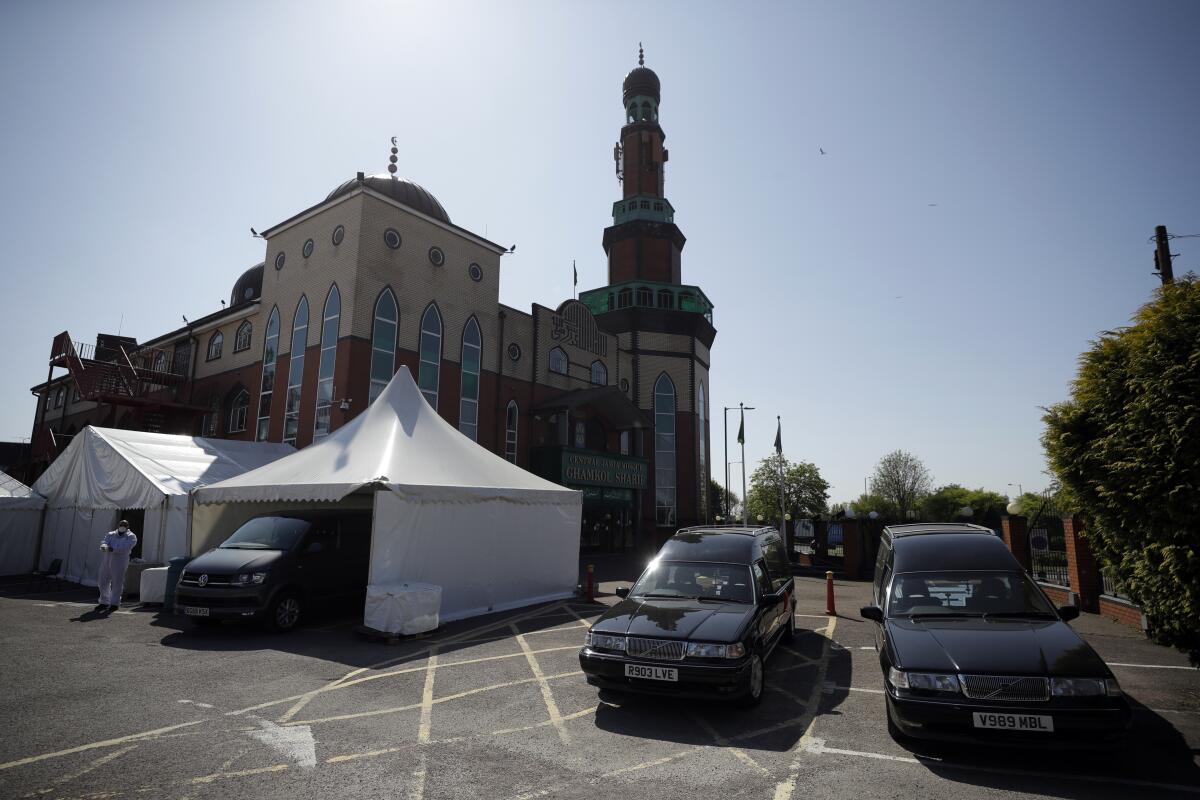
- Share via
BIRMINGHAM, England — The holy month of Ramadan is underway, and the Central Jamia Mosque Ghamkol Sharif in Birmingham should be full of worshipers. But this year, the main arrivals are the dead.
While the mosque in the central England city has been closed in response to the coronavirus crisis, its parking lot has been transformed into a temporary morgue with room for 150 bodies.
The volunteer-run mortuary, with its white tents, industrial refrigerators and neat stacks of coffins, is evidence of the toll the virus is taking on Britain’s Muslim and ethnic-minority communities. The two most diverse and most populous regions of the U.K. — London and the Midlands area centered on Birmingham — have seen the largest number of deaths in the outbreak.
Mohammed Zahid, a mosque trustee who helped set up the mortuary with a firm of Muslim funeral directors, said the mosque in Birmingham’s predominantly South Asian Small Heath district normally holds one or two funerals a week.
In the last few weeks, “we were doing five to six a day,” he said.
“You can see how the families were grieving,” said the 44-year-old Zahid, who wears a mask, coveralls and gloves as he moves among the coffins.
Local government social-distancing rules allow only six people to attend each burial.
“Especially when they can’t get their own cousins and brothers and sisters around them — it’s made it really hard for the people who’ve lost their loved ones,” said Zahid, who has lost two aunts to COVID-19. “What do you say to a family who’s got five sons or daughters, and some of them have to stay home?”
The British prime minister’s office said he would be back at 10 Downing St. on Monday, two weeks after being hospitalized with the coronavirus infection.
It’s a similar story at the nearby Green Lane Mosque, where coffins lie stacked up inside the prayer hall. Usually the mosque holds about 25 funerals a year. For the last three weeks it has seen five a day.
“Everybody’s worrying about whether it will be their family members next, their loved ones,” said Saleem Ahmed, the mosque’s head of welfare and services.
Britain has recorded more than 20,700 hospital deaths of people with coronavirus. Thousands more are likely to have died in nursing homes.
The virus has hit people of all ages and backgrounds, including Prime Minister Boris Johnson, who spent three nights in intensive care. But evidence suggests that ethnic-minority Britons are feeling a disproportionate impact.
Statistics show that 16% of those who died in Britain with the coronavirus up to April 17 were from black, Asian or other minority-ethnic backgrounds. About 14% of the U.K. population comes from those backgrounds.
Even more starkly, data from Intensive Care National Audit and Research show that a third of people in intensive care with COVID-19 in the U.K. are nonwhite. And many of the more than 100 healthcare workers who have died in the outbreak were from black, Asian or other minority-ethnic backgrounds.
Latinos in San Francisco account for 25% of positive coronavirus cases, but make up only 15% of the San Francisco population, Mayor London Breed said.
The government has asked public health officials to investigate the virus’ heavy impact on minorities.
A similar trend has been seen in countries including the United States, where an Associated Press analysis found that about 42% of Americans who have died from COVID-19 were black, while African Americans account for roughly 21% of the population in the areas analyzed.
In France, the poor and largely immigrant neighborhoods on the fringes of Paris have seen some of the highest increases in mortality since the outbreak began.
Kamlesh Khunti, a professor of primary care, diabetes and vascular medicine at the University of Leicester, said complex factors may be involved. While black Americans often have worse access to medical care than white Americans, “in the U.K. we have a free healthcare service, so we can’t put it down to just inequalities in care,” he said.
Khunti said ethnic-minority Britons are more likely to live in large, multi-generational families and cramped housing. Many hold jobs with a high risk of infection: doctors, nurses, taxi drivers and transit workers.
Black and South Asian people, in Britain and elsewhere, also have higher rates of cardiovascular disease, diabetes and hypertension, conditions that have been linked to more severe COVID-19 symptoms.
Others argue that racism is a factor. Gurch Randhawa, professor of diversity in public health at the University of Bedfordshire, said extensive research shows that minority nurses and healthcare assistants “often receive poorer treatment than their colleagues.”
“In the context of the present crisis, this means they may have worse access to [personal protective equipment], more trying shift patterns and greater exposure to COVID-19 patients,” he said.
Queen Elizabeth II offered support to a country locked down in the coronavirus pandemic, promising the nation that it would rise to the challenge and overcome the outbreak.
In Birmingham’s Muslim community, everyone seems to know someone who has died. Haly Bano lost her uncle, a taxi driver who likely caught the virus from a customer.
“It is really hard for Mum, because she can’t go to pay respects to the family or anything,” she said. “So we just called on the phone and FaceTimed and that’s all we could do.”
Picking up meat for a Ramadan meal in the predominantly South Asian Sparkbrook neighborhood, Bano said she was shocked at the number of people thronging the supermarkets and butcher shops. Some wore masks but few were following government instructions to remain more than six feet apart.
“People are not listening,” she said. “It is really scary and dangerous.”
At the Ghamkol Sharif mosque, Zahid is thankful that the temporary morgue hasn’t reached its capacity. It was set up amid fears that without sufficient refrigerated storage, bodies would have to be cremated, counter to Muslim custom. But everyone who has been brought here has had a proper burial.
“We just make sure they get their final rites,” Zahid said.
Scientists say Britain has likely passed the peak of its outbreak. The number of people hospitalized is declining, and the increase in the number of deaths has slowed, even though hundreds with COVID-19 are still dying each day.
Zahid said that, in the past week, the number of bodies arriving at the mosque has ebbed, but the anxiety has not.
“There is fear in people about the corona[virus], there’s no doubt about that,” Zahid said.
“Whatever comes, comes from God,” he added. “We just have to carry on doing what we’re doing.”
More to Read
Sign up for Essential California
The most important California stories and recommendations in your inbox every morning.
You may occasionally receive promotional content from the Los Angeles Times.
